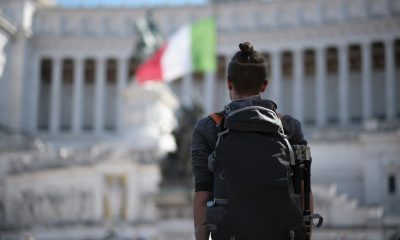קאָראָנאַווירוס
G7: מיטאַרבעט, ניט פאַרמעסט איז דער שליסל צו COVID וואַקסאַניישאַנז

The G7 summits of the world’s richest countries are not generally known for epochal decisions influencing global politics for years to come. In that sense, this year’s edition in the UK could be considered a rare exception to the rule, because of the פֿאַראייניקטע פראָנט the United Kingdom, Germany, France, Japan, Italy, Canada and the United States presented against China, increasingly viewed as their systemic rival, שרייבט קאָלין סטעווענס.
פאַך on China to “respect human rights and fundamental freedoms” as well as a “timely, transparent, expert-led and science-based” enquiry into the causes of the coronavirus pandemic, the G7 leaders affirmed a contrarian attitude towards China’s rising global influence. In its response, Beijing unsurprisingly באַשלאָסן the summit as “political manipulation” and “baseless accusations” against it.
While the anti-Chinese stance has profound geopolitical implications, the strong attention on blows traded between the G7 bloc and China largely drowned out – if not actively undermined – another equally important political decision of the summit: the issue of increasing global Covid-19 vaccination rates. Despite this being the main objective of the Summit, world leaders fell off the mark.
Falling short by 10 billion doses
At the summit, G7 leaders פּלעדזשד to provide 1 billion doses of Covid vaccine to the world’s poorest countries through various sharing schemes, with French President Emmanuel Macron announcing that Germany and France would commit additional 30 million doses each. Highly outspoken about the need to vaccinate world if the pandemic is to be brought under control ahead of the event, Macron also demanded to אָפּזאָגן vaccine patents to achieve the goal of vaccinating 60 percent of Africa by the end of March 2022.
Although these demands and the pledge for 1 billion doses seem impressive, the hard reality is that they will not be nearly enough to lead to a meaningful vaccination rate across Africa. According to estimates by campaigners, low-income countries need at least קסנומקס ביליאָן doses to the tune of $50 billion. This means that at a time when infection rates across Africa are surging at אַנפּרעסידענטיד speeds, the doses promised by the G7 is but a drop in the ocean.
Donations, IP wavers and expanding production
However, it’s not all doom and gloom. The G7 did add an unexpected twist in the final communiqué: a call for increasing the production of vaccines, “on all continents”. The underlying idea is that the world will be more resilient if it is more nimble and can quickly scale up production in case of need – for example, for booster shots or for the next pandemic.
This model of distributed production will not be able to rely solely on India’s Serum Institute. Luckily, other countries have gotten involved, with the United Arab Emirates (UAE) becoming earlier this year the first Arab country that manufactures a vaccine – the Hayat-Vax’, the indigenously produced version of the Sinopharm vaccine.
The UAE began manufacturing Hayat-Vax at the end of March this year, and following the inoculation of the majority of its population, is פּאַזישאַנינג itself as a main exporter of the vaccine to lower-income countries as part of the global COVAX initiative. Several African countries have already באקומען doses from the UAE, as have several Latin American countries, as the Emirates and China are planning to deepen their cooperation to פאַרגרעסערן regional vaccine production. There is little doubt that other countries will take part in this historic effort.
The G7’s warped priorities
When Macron talked about expanding the production of vaccines worldwide, he was likely referring to the steps taken by regional vaccine producers like the UAE. Yet considering the urgency of the situation, this year’s G7 is a costly missed opportunity in moving global vaccine diplomacy forward in a meaningful way.
It’s already evident that the EU, the US and Japan cannot alone produce enough vaccine doses for export while their own national vaccination programmes are still under way. This has been particularly evident in Europe, where internal political tensions have emerged as the debate on whether EU adolescents should be פּרייאָראַטייזד over the countless millions in the Global South has risen in prominence, indicating that Europe is currently unable to see the bigger picture in the fight against the virus – namely that every dose counts.
Moreover, export restrictions on certain ingredients vital in the production of vaccines needs to be addressed without delay. The same goes for the (difficult) question of patents and intellectual property.
If G7 nations fail on both these counts, the world’s largest economies will have undermined their own credibility at a time when vaccinating the world should be at the very top of the agenda. Besides engaging with non-Western producers, this must necessarily include sharing American and European vaccine technology with third countries as well, something Germany in particular has פארשטיינערט.
If this year’s G7 shows the world one thing, then it is that the needy cannot buy anything with the underwhelming promises made. Good intentions are simply not enough: now is the time for action.
שער דעם אַרטיקל:
-

 טאַביקקסנומקס טעג צוריק
טאַביקקסנומקס טעג צוריקפארוואס אי.יו. פּאָליטיק אויף טאַביק קאָנטראָל איז נישט ארבעטן
-

 טשיינאַ-אי.יו.קסנומקס טעג צוריק
טשיינאַ-אי.יו.קסנומקס טעג צוריקפאַרבינדן הענט צו בויען אַ קהילה פון שערד צוקונפֿט און שאַפֿן אַ ברייטער צוקונפֿט פֿאַר טשיינאַ-בעלגיע אַלע-קייַלעכיק פּאַרטנערשיפּ פון פרייַנדלעך קאָאָפּעראַטיאָן צוזאַמען
-

 אייראפעישער קאַמישאַןקסנומקס טעג צוריק
אייראפעישער קאַמישאַןקסנומקס טעג צוריקניט גאַנץ פריי באַוועגונג געפֿינט צו וק פֿאַר סטודענטן און יונג טוערס
-

 אייראפעישער קאָונסילקסנומקס טעג צוריק
אייראפעישער קאָונסילקסנומקס טעג צוריקאייראפעישער קאָונסיל אקטן אויף יראַן אָבער האפענונגען פֿאַר פּראָגרעס צו שלום


























